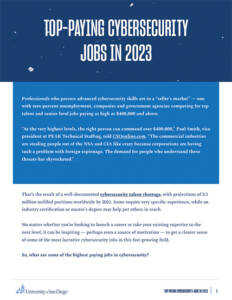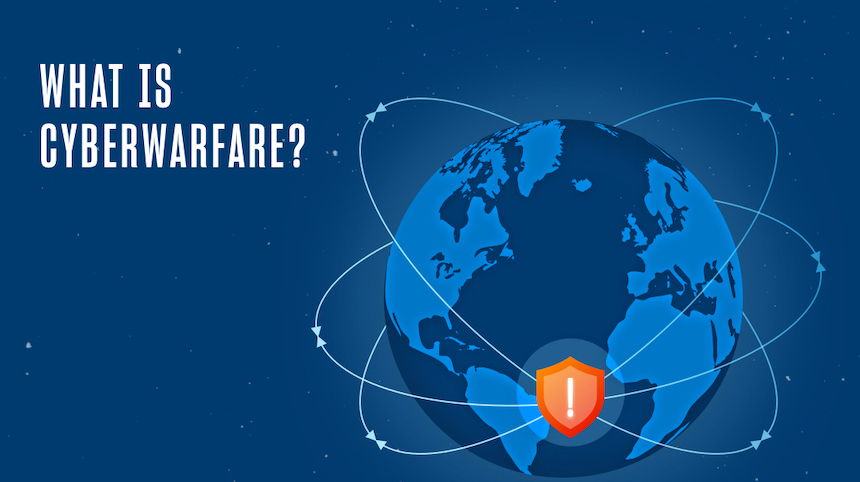It’s no secret that careers in technology have skyrocketed in recent decades, with hundreds of thousands of jobs added each year and no indication that the pattern will break. For anyone looking to join the increasingly popular industry, or set themselves apart, education is crucial.
Though plentiful, technology jobs cover a range of responsibilities, meaning you will need to set your sights on a particular area of work. Today, a common consideration in the process is whether to pursue a cybersecurity or information technology degree. We created this guide to help you evaluate each option and show you what USD can offer to help reach your career goals.
What Is a Cybersecurity Degree?
A master’s degree in cybersecurity is intended for students with bachelor’s degrees who want to protect technology systems. Lessons center on different types of cyber attacks, email phishing, data breaches and costly ransomware. Because of how quickly cyber threats evolve, professionals can also benefit from learning the latest developments in pursuit of a master’s degree in cybersecurity.
What Is an Information Technology Degree?
A master’s degree in information technology typically spans a year or two, during which students are prepared for management-related positions in tech or to further develop their skills in a particular area of study, such as data analytics. Ideal participants have experience (or an undergraduate degree) in software engineering, computer engineering or computer science. Curriculum commonly includes programming concepts for IT, business data communications, systems analysis, information resource management, e-commerce and data warehousing.
What’s the Difference Between a Cybersecurity and Information Technology Degree?
The biggest difference between cybersecurity versus information technology is scope. An IT degree is more general, whereas a cybersecurity degree is typically specialized.
In practice, IT deals with the use of computers and networks, software development and infrastructure, while cybersecurity focuses on keeping those systems safe from attacks. Digital forensics and incident response also fall under the purview of a cyber security expert.
Careers for Cybersecurity and Information Technology Degree Holders
Job outlook and earning potential are promising for both cyber security and IT specialists. Experts say the average annual cybersecurity salary is $93,395 — well above the average of $47,520 across industries. That’s also the case for IT specialists, who earn an average salary of $81,241 each year. The salary ranges for each career are similar, from about $69,000 to $125,000 for cyber security professionals and $58,000 to $113,000 in IT.
Certifications can also play a role by showing an employer that you invested the time to improve skills and knowledge. Though not required, many technology professionals will opt for certifications as a means to stand out.
Folks who earn an advanced cybersecurity degree typically land in the following positions:
- Cyber Threat Intelligence Analyst
- Cryptanalyst
- Computer Forensic Analyst
- Data Protection Officer
- Cybercrime Investigator
- Malware Analyst
- Security Consultant
- Chief Privacy Officer
Advanced information technology degree holders report working in these roles:
- Computer and Information Research Scientist
- Computer Network Architect
- Computer Programmer
- Computer Support Specialist
- Computer Systems Analyst
- Software Developer
- IT Technician
- Support Specialist
- Web Developer
- Network Engineer
CAREERS & SALARY BY DEGREE
The following chart lists possible careers and projected salaries for candidates with each respective degree. Salary and earnings are always subject to individual employers, location and additional factors.
| Cybersecurity | Information Technology |
| Cybersecurity Sales Engineer ($115,000) Penetration Tester ($124,424) Cybersecurity Architect ($147,142) Network Security Engineer ($129,888) Chief Information Security Officer ($239,893) | Database Engineer ($90,041) User Experience Designer ($93,266) Front-end Developer ($102,092) Data Warehouse Architect ($119,557) Site Reliability Engineer ($133,340) |
Salary estimates from employment sites such as the U.S. Bureau of Labor Statistics, LinkedIn, Springboard, Glassdoor, ZipRecruiter, Indeed, etc. Estimates often update in real time based on changing data.
COURSEWORK COMPARISON
These cybersecurity courses are specific to the University of San Diego.
| Cybersecurity | Information Technology |
| Foundations of Cybersecurity Applied Cryptography Enterprise Security Architecture Cybersecurity Law and Policy Software Design and Development | Fundamentals of IT Leadership Server Operations DevOps IT Service Management Enterprise Applications, Data Management and Reporting |
INDUSTRY DEMAND
| Cybersecurity | Information Technology |
| Cybersecurity jobs are projected to grow 32% in the 10-year span from 2022 to 2032; much faster than the average for all occupations, which is 3%. | IT jobs are projected to grow 23% in the 10-year span from 2022 to 2032; much faster than the 3% average for all occupations. |
Based on projections from the U.S. Department of Labor Statistics
Which Degree Is Right for Me?
The process of deciding which degree to pursue is uniquely personal. Your decision will be based on individual interests and career goals. To help determine the best fit, ask yourself the following questions:
- Does the program align with my budget and schedule?
- What am I primarily interested in: The broader study of computers (IT) or protecting those systems (cybersecurity)?
- Can I leverage my personal experience to excel in a particular program?
- Where have past students ended up working after completing the program?
Learn more about the value of a cybersecurity degree over time, career outlook and the benefits of an online education with the USD eBook, “Getting a Degree in Cybersecurity: 8 Important Considerations.”
Citations
- Zippia, “25 Trending Tech Industry Statistics [2023]: Tech Industry Demographics, Worth and More, https://www.zippia.com/advice/tech-industry-statistics/”
- Indeed, “A Beginner’s Guide to Information Technology, https://www.indeed.com/career-advice/finding-a-job/what-is-information-technology”
- Zippia, “Cyber Security Specialist Salary, https://www.zippia.com/cyber-security-specialist-jobs/salary/”
- Zippia, “Information Technology Specialist Salary, https://www.zippia.com/information-technology-specialist-jobs/salary/”
- U.S. Bureau of Labor Statistics, “Computer and Information Technology Occupations, https://www.bls.gov/ooh/computer-and-information-technology/home.htm”





